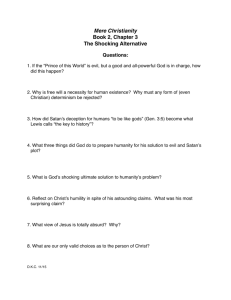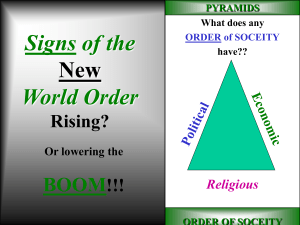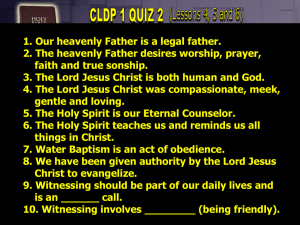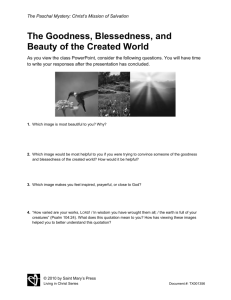Summary of “The Gospel in Genesis”
advertisement
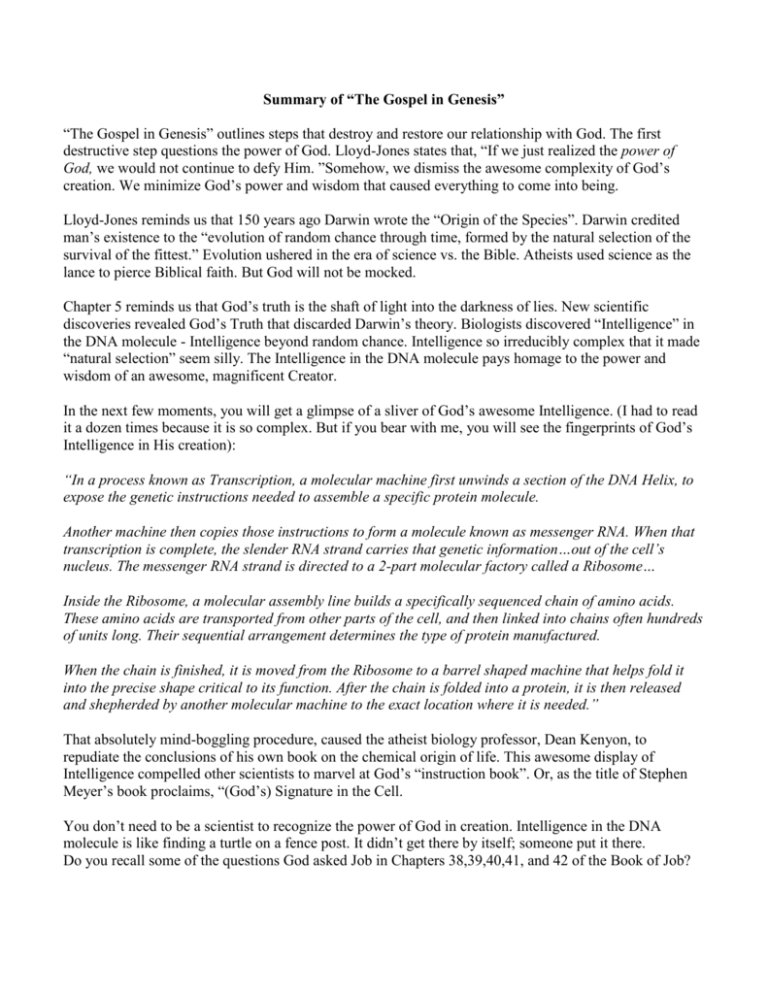
Summary of “The Gospel in Genesis” “The Gospel in Genesis” outlines steps that destroy and restore our relationship with God. The first destructive step questions the power of God. Lloyd-Jones states that, “If we just realized the power of God, we would not continue to defy Him. ”Somehow, we dismiss the awesome complexity of God’s creation. We minimize God’s power and wisdom that caused everything to come into being. Lloyd-Jones reminds us that 150 years ago Darwin wrote the “Origin of the Species”. Darwin credited man’s existence to the “evolution of random chance through time, formed by the natural selection of the survival of the fittest.” Evolution ushered in the era of science vs. the Bible. Atheists used science as the lance to pierce Biblical faith. But God will not be mocked. Chapter 5 reminds us that God’s truth is the shaft of light into the darkness of lies. New scientific discoveries revealed God’s Truth that discarded Darwin’s theory. Biologists discovered “Intelligence” in the DNA molecule - Intelligence beyond random chance. Intelligence so irreducibly complex that it made “natural selection” seem silly. The Intelligence in the DNA molecule pays homage to the power and wisdom of an awesome, magnificent Creator. In the next few moments, you will get a glimpse of a sliver of God’s awesome Intelligence. (I had to read it a dozen times because it is so complex. But if you bear with me, you will see the fingerprints of God’s Intelligence in His creation): “In a process known as Transcription, a molecular machine first unwinds a section of the DNA Helix, to expose the genetic instructions needed to assemble a specific protein molecule. Another machine then copies those instructions to form a molecule known as messenger RNA. When that transcription is complete, the slender RNA strand carries that genetic information…out of the cell’s nucleus. The messenger RNA strand is directed to a 2-part molecular factory called a Ribosome… Inside the Ribosome, a molecular assembly line builds a specifically sequenced chain of amino acids. These amino acids are transported from other parts of the cell, and then linked into chains often hundreds of units long. Their sequential arrangement determines the type of protein manufactured. When the chain is finished, it is moved from the Ribosome to a barrel shaped machine that helps fold it into the precise shape critical to its function. After the chain is folded into a protein, it is then released and shepherded by another molecular machine to the exact location where it is needed.” That absolutely mind-boggling procedure, caused the atheist biology professor, Dean Kenyon, to repudiate the conclusions of his own book on the chemical origin of life. This awesome display of Intelligence compelled other scientists to marvel at God’s “instruction book”. Or, as the title of Stephen Meyer’s book proclaims, “(God’s) Signature in the Cell. You don’t need to be a scientist to recognize the power of God in creation. Intelligence in the DNA molecule is like finding a turtle on a fence post. It didn’t get there by itself; someone put it there. Do you recall some of the questions God asked Job in Chapters 38,39,40,41, and 42 of the Book of Job? Here are just a few: “Where were you when I laid the foundations of the world?” “Hast thou entered into the depths of the sea?” “By what way is the light spread, or heat divided up?” “Shall thou be able to string together the stars of Pleiades? “Do you know the laws of the universe, and how the heavens influence the earth?” Then Job replied, “What can I answer?” Job put his hand over his mouth and fell to the ground. Today’s scientists proclaim God’s greatness with each discovery to the questions God asked Job: Geologists and anthropologists confirm, that the dazzling display of thousands of fully formed fossils found in the “Cambrian Explosion”, were created in a geological blink of an eye. This stunning variety of complex creatures has no “Transitional” fossils (before & after) as required by Darwin’s evolution. Also, the Grand Canyon is not just an icon of beauty. It is a solemn witness not only to the Omnipotent Creator off all things, but also speaks of God’s world convulsing Judgment at the time of the Great Flood. Christ said in Luke 19:14, “If these (disciples) become silent, the stones will cry out.” Physicist Patrick Glyne abandoned his atheism and said, “The concrete data points to God”. Astronomers and Astrophysicists conclude that, “If the universe had not been made with the most exacting precision, we could never have come into existence.” Earth’s location, size, composition, structure, atmosphere, temperature, internal dynamics, and many intricate cycles essential to life (i.e. the carbon cycle, etc.) testify that our planet is exquisitely balanced. These highly choreographed geological processes are precisely tuned for life, and point to a Designer with a purpose for mankind. From microscopic molecules, to the fossil record of living things on earth, to the sun, the moon and the stars, irrefutable scientific facts point to the complex power and wisdom of a Creator, who made us in His Image and Likeness. Romans 1:20 confirms, “For since the creation of the world…His eternal power, and divine nature have been clearly seen…through what has been made, so they are without excuse.” The second problem stated in “The Gospel in Genesis” is that we ignore the goodness of God. God’s goodness is abundantly clear in the Gospel of John. As the author sees the Gospel in Genesis, we see Genesis in the Gospel of John. The Incarnation of Divine Love is expressed in the opening paragraph, “In the beginning was the Word, and the Word was with God, and the Word was God. All things were made through Him, and Without Him, nothing was made. In Him was life, and the life was the light of men. And the light shines in the darkness. And the darkness, grasped it not.” – (John 1; 1-5). The goodness of God is clearly stated in John 3: 16, “For God so loved the world, that He gave His only son, that those who believe in Him may not perish, but have life everlasting.” In John 15: 13 Christ reminds us, “No one has greater love than this, that one lay down his life for his friends.” As a result, no sin, no matter how vile or frequent, can exceed the forgiveness of the welcoming embrace of the outstretched arms of the Redemptive Cross. Christ distinguishes the life of the spirit from the life of the flesh in John 6: 63, “It is the spirit that gives life. The flesh profits nothing. The words I have spoken to you are spirit and life.” Christ gives the requirement for the life of the spirit in John 13: 34-35, “I give you a new commandment: Love one another as I have loved you. By this, shall all men know that you are my disciple, if you love one another as I have loved you.” Christ tells us of the benefit of keeping His command in John 14: 1, “Do not let your hearts be troubled. In my Father’s house there are many mansions.” Christ assures us of God’s ongoing support in John 14: 16-17, “And I will ask the Father, and He will give you another Advocate to be with you always - The Spirit of Truth, which the world cannot accept, because it neither sees it, nor knows it.” God’s goodness is not diminished because bad things happen to good people (“How inscrutable His judgments. How unsearchable His ways.) Or, as Paul asserts in Romans 8: 28, “For those that love God, all things work together for good, for those who are called according to his purpose.” Nor do the pleasures and treasures of the secular culture diminish God’s goodness, as Solomon observed, after tasting all the world’s pleasures and treasures, “Vanity. All is vanity.” The facts of God’s greatness and goodness are clear and irrefutable, and profoundly humbling. But Lloyd-Jones warns of a disruptive third factor: Satan. Satan exists. He resides in the soft underbelly of our humanity, where pride…lust…greed…control…and lies… fester. “The devil’s boots don’t creak”. He camouflages our choices between good vs. apparent good. So our souls suffer the 1000 cuts of compromise and rationalization. We ignore the toxins of sin because we enjoy its perfume – like 99% of rat poison is attractive to the rat. Satan’s deception leads to Paul’s lament in Roman’s 7, “When I want to do good, I don’t. When I want to avoid evil, I do it anyway.” The secular culture’s creed is, “What’s in it for me?” and “If it feels good, do it.” Sadly, the suicides of the rich and famous are the legacies of the secular culture. More insidious, are the secular lives of quiet desperation, wondering, “Is that all there is?” and “Who moved my cheese?” They conclude that their “lives were full of sound and fury, signifying nothing.” Satan’s lies are not the solution they promised to be. They are illusions – holograms of happiness. Christ describes the devil in John 8: 45, “When he (Satan) tells a lie, he speaks from his very nature, for he is a liar, and the father of lies.” Fortunately, Grace allows us to die to the things that Christ died for. Grace allows us to live without fear or worry about the trivial and transient things that Satan says are important. Satan wants men to worry about themselves – to live in regret of the past and fear of the future. God wants men to trust Him, and “Be not afraid” to live as God’s friend, today. We really need to focus on that “Today” part. The benefit of living as God’s friend is not just some deferred compensation after death. God’s current blessings trump Satan’s immediate gratifications by any measure, because God is sovereign over Satan. (Refer to Creation and Easter.) There is no need to straddle the two choices – Satan’s secular pleasures and God’s blessings – to enjoy the fullness of life. We miss nothing of value being God’s friend. Yet, some choose to live according to the secular world’s expectations, under the rationalization that they need to be responsible husbands and fathers and citizens. They need to pay the mortgage, and make the car payments, provide food, clothing, and the best opportunities for their children. They believe that working to the fullest of their God given talents gives praise and honor to God. Maybe. Maybe that’s just Satan whispering in their ear to do their will. A good litmus test is the Psalmist prayer, “Give me neither poverty, nor riches. Lest I be full, and deny my God. Lest I be desperate, and by stealing, defile the name of my Lord.” And, “The Lord is my shepherd, I shall not want.” An example of the former Psalm’s denial & defile is Bernie Madoff. An example of the later Psalm is Mother Theresa. (Mother Theresa never took donations for more than one year’s expenses. Think about that.) In Philipians 3: 8, Paul further clarifies the distinction of our two choices, “I consider everything a loss, because of the good knowing Christ Jesus my Lord. For His sake, I have accepted the loss of all things, and consider them so much rubbish, that I may gain Christ.” Some may scoff that those words are just biblical hyperbole, irrelevant for the 21st century. Or, as Marx labeled religion as “The opium of the masses.” Contrary to those misguided assessments, is the story of a contemporary man who tried to serve 2 masters. It’s the story of an industrious guy who enjoyed the fruits of secular self-reliance, while appearing to be a good Christian. That man left Law School at 22 to start a 70-bed transitional care facility for recovering alcoholics. Below the surface of that compassion was the self-interest of a lucrative salary and the doubling of rental income for the building he owned. As a result, he drove his 2-seater 280 SL Mercedes Benz convertible from work to his 6th floor apartment in the Cudahy Tower overlooking Lake Michigan. When he met his wife, he sold his interest in the care facility. He parlayed subsequent management positions with other companies, each paying more than the previous, into an opportunity to own his own business. All of these lucrative opportunities were rationalized as the application of his God-given talents to provide his family with the things that the world valued as successful: a big house, several cars, a Country Club membership, and annual vacations to 5 star resorts. Life was good - all testimony to his self-reliance, self-importance, and self-indulgence. He appeared to be a good Christian. He attended church on Sunday, gave to the needy, and was a good neighbor and citizen, just like a good Christian. Only, if you looked inside his soul, you would find “a whitened sepulcher, filled with filthy rags.” Like the builders of Babel, life was all about him. After decades of this secular indulgence, his health mysteriously deteriorated and his business failed because of 3rd party events. Diagnostic tests and excessively expensive treatments for a progressively debilitating disease drained most of his savings. His personal guarantee of business debts drained the rest, and the loss of all income forced the sale of his home. He wound up living in his daughter’s basement. All attempts to save the business or find replacement income failed, leaving him with no money, no income, and a progressive disease of unknown cause. He took a job as a document courier. As waves of outrageous fortune broke over him, only the rock of God’s sovereignty over all things protected him. During this time of loss, he attended a bible study group. He began to read the Bible and other related books – like “The Return of the Prodigal Son”, “The Purpose Driven Life”, “The Seven Seasons of the Man in the Mirror”. He studied Job, who in pain and loss, proclaimed, “God knows me.” and “My Redeemer lives.” Over time, he became aware of God’s greatness and goodness, culminating in the repentance of his displacement of God, and the acceptance of Jesus Christ as his personal savior. He discarded his previous prayers of petition, seeking selfish outcomes. Instead, he prayed as a creature to his Creator, as a servant to God’s will, “Majestic Creator, Loving Redeemer, and Holy Spirit, grant me the clarity of mind to recognize Your will, the sincerity of heart to accept Your will, and the courage to do Your will. His prayer resembled the Psalmist, “I delight to do your will, O Lord. Your laws are written upon my heart.” His conversion from selfishness to servant was followed by unexpected, undeserved gifts of God’s grace. His wife, who was a periodic substitute for 10 years, was given a full-time position as a grade school teacher. Her hiring provided him with health insurance, replacing his $2,250 monthly premiums. They would have to move from their daughter’s home to make room for her baby. The home search was fruitless because of credit, down payment, and income deficiencies, all below acceptable standards. A realtor showed him a condo that a developer was financing. A week later, they owned a home. $900,000 of life insurance policies that expired for non-payment of premiums were re-instated back to the date of the on-set of his disability, because of a previously ignored Disability Waiver of Premium clause. Recently, at a class reunion, a friend talked about his non-profit agency that did wonderful work for troubled kids and adults with mental illness, but lacked the funding to do more. The classmate offered the man a job to raise money; so more counselors could help more persons with life’s challenges. That man’s story is testimony to the power of God’s grace and the rich fullness of God’s blessings. Likewise, Lloyd-Jones uses the story of Abraham to confirm the value of rebuking Satan and living as God’s friend. Abraham was living in a pagan land. Through faith and obedience, “Abraham went out not knowing wither he went.” By faith, Abraham lived in communion with God, enjoying God’s blessings. God is calling us to the same type of life. God’s call may come through an illness or a business loss. There are thousands of ways in which it happens. God speaks to us through events and circumstances, entirely outside our control. But that call is not general – it’s a specific call. Abraham was told to separate himself from all that had been his life. He had to leave everything. That’s what the bible calls repentance. It means to think about the life we were living, and to confess that it was wrong, that it was separate from God’s will – dishonoring to God, and glorifying ourselves. We were living for things that cannot satisfy. They appeared desirable, but were not durable. Like Abraham, we hear God’s call to come out of that life, to sacrifice and live in communion with God. (N. B. The word “sacrifice” does not mean “loss”. It comes from 2 Latin words: sacri faciam, to make holy.) In the final analysis, the outcome of our choice is determined at death. Shakespeare asks, “What dreams may come when we shed this mortal coil?” Christ replies, “Whoever believes in me, shall have eternal life.” The Bible answers Satan’s alternative life style with, “The wages of sin is death.” So at the time of our bodily death, our spirit is like a ship sailing from view over the horizon, only to see the welcoming embrace of the outstretched arms of the Redemptive Cross, along with family and friends of previous passing, on the other shore – no more death, nor pain, nor tears. In conclusion, The “Gospel in Genesis” answers several questions: Who are we? Science has shown who we are not. We are not just some flotsam and jetsam, formed by random chance that “Struts and frets its hour upon the stage, and is heard no more.” Clearly, we were made by God and for God. We are spiritual beings, temporarily expressed trough our humanity, like temporal parentheses midst eternity. “We don’t have a soul. We are a soul. We have a body.” – (C. S. Lewis) So, why are we the way we are? We have free will. Satan exists. Adam sinned. And the initial perfect relationship with God was broken. Likewise, the contemporaries of Noah and the builders of Babel turned away from God, toward themselves. Satan’s most devious deception is to diminish the greatness and goodness of God on earth. “Why is life so hard?” Satan nurtures our separation from God. Satan sows discontent between our needs and the expectations of our wants. Our wants are “plus-one” of whatever we have, never fulfilled, always in excess of our daily bread. Lives built upon the secular culture crumble under Satan’s broken promises. The fruits of selfindulgence are bitterness and despair. We wake-up so lost, in a place so dark, from the intoxicant of selfreliance. And self-importance merely masks self-destruction. Is there any hope? Yes – in abundance. The God who made us loves us so much. The Incarnation of Divine Love, Jesus Christ, is the New Covenant between God and man. Christ’s Redemptive Cross bridges the chasm between creature and Creator. By loving God and each other as God loves us, we live as God’s friend, enjoying His blessings. By repentance of our sins and acceptance of Jesus Christ as Our Personal Savior, we experience the awesome awareness of the presence of God within us. To that end, I pray the prayer of Psalm 42, “As the deer pants for the flowing stream, So my soul thirsts for the living God. What are our choices?” Lloyd-Jones provides two choices: Satan’s deceptions and God’s blessings. “The Gospel in Genesis” provides a clear distinction between the two. There is no middle ground, no serving two masters. Isn’t it odd, the we can believe in the power of a Majestic Creator and the mercy of a Loving Redeemer to provide eternal comfort for our soul, but not trust that same God to provide the simple necessities of shelter, food, and clothing for our bodies, on earth? Christ reminds us that God, who provides for the birds of the air, will certainly provide for those made in His image and likeness. The perfect choice is found in Romans 12:11, “Do not conform yourselves to this age, but be transformed by the renewal of your mind, that you may discern what is the will of God, what is good and pleasing and perfect.” Amen. Respectively Submitted By: Paul Maliszewski

